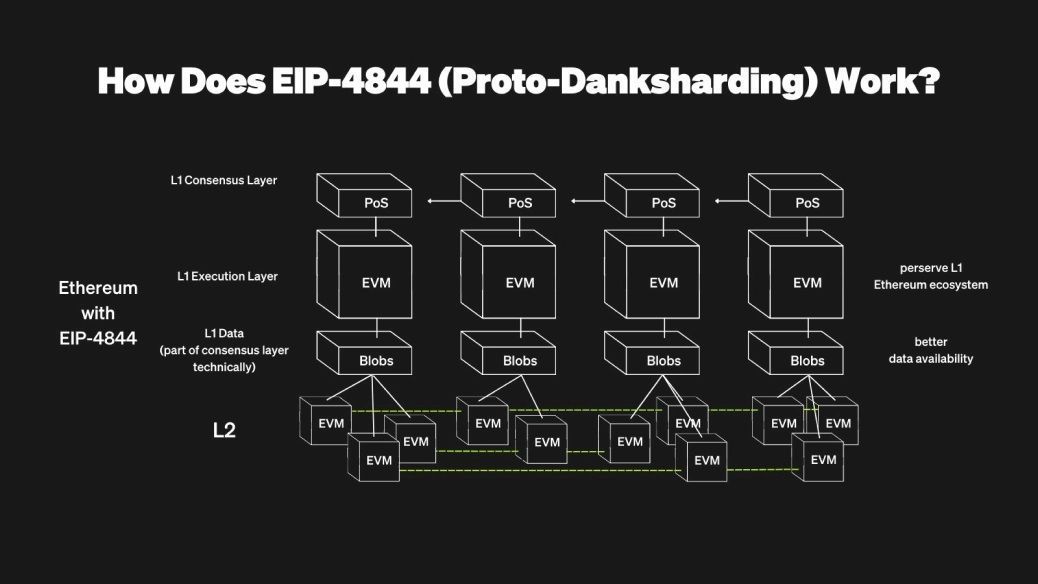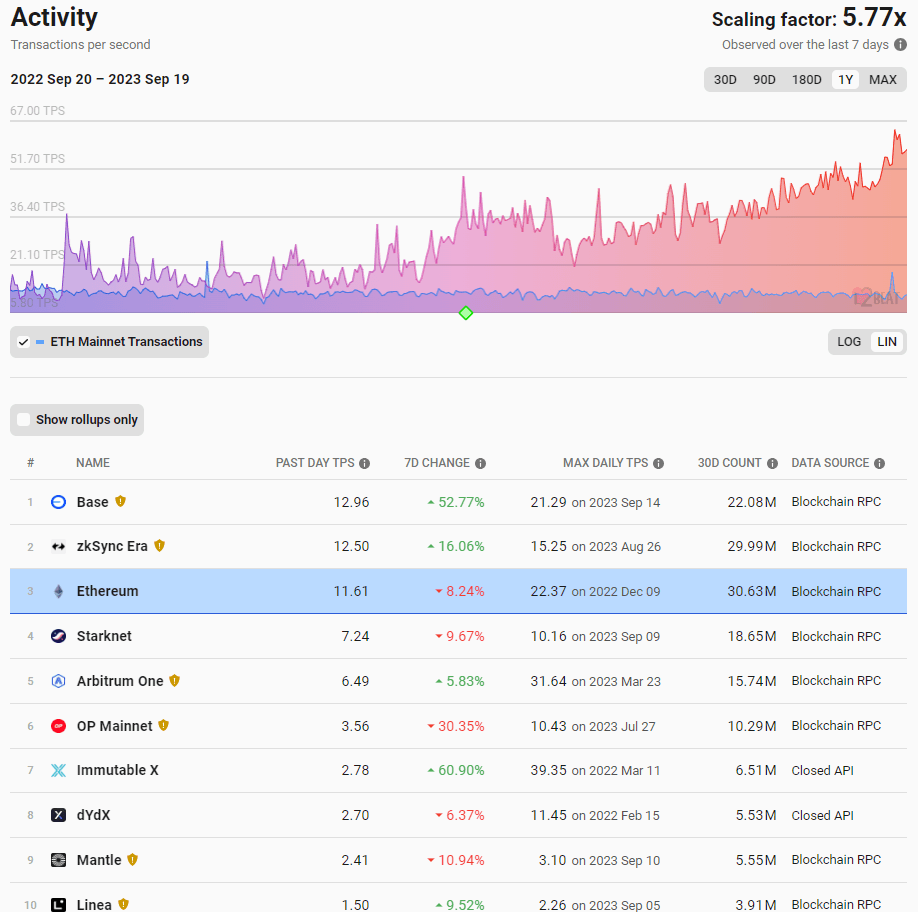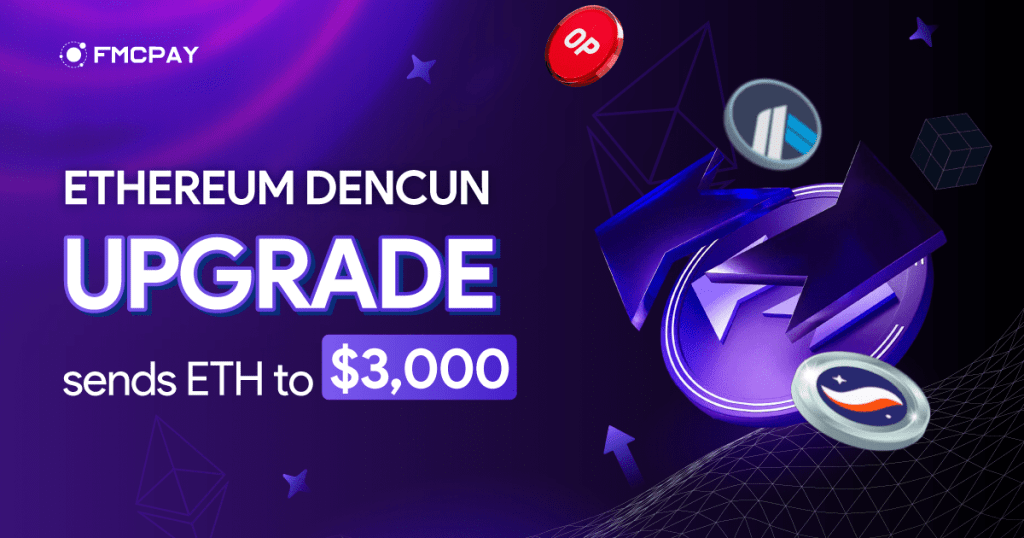After successfully completing the Shanghai/Capella upgrade in April 2023, Ethereum’s core developers have been working hard to prepare Ethereum Dencun Upgrade
The latest update: Ethereum’s anticipated Dencun is coming!
“On Jan 17, at 6:32 UTC, Dencun will activate on the testnet! It will be the last network upgrade before Goerli shuts down in a few months”, Tim Beiko, at Ethereum Foundation was confirmed on Twitter
Blobs are coming to Goerli .oO
On Jan 17, at 6:32 UTC, Dencun will activate on the testnet! It will be the last network upgrade before Goerli shuts down in a few months.
More info on the upgrade, client releases, and more, in the full announcement 📣https://t.co/WJ7GYT6Sbk
— timbeiko.eth ☀️ (@TimBeiko) January 11, 2024
Tim Beiko, a representative of the Ethereum Foundation, expressed concerns about the delay in Dencun’s deployment on the mainnet. This concern arises because the upgrade has not yet undergone testing on public networks like Goerli, Sepolia, and Holesky. Beiko highlighted the risks associated with not testing Dencun on a public network before the Ethereum developer conference scheduled for November 2023.
The highly anticipated Ethereum upgrade, known as Deneb-Cancun or “Dencun,” is likely to face a delay until early next year, as indicated by statements from core developers. This upgrade aims to address scalability issues within the Ethereum ecosystem by implementing Ethereum Improvement Proposal (EIP) 4844.
If testing doesn’t begin by November, Dencun might not be activated on the mainnet this year and could potentially be delayed until 2024. The readiness for Dencun’s mainnet deployment depends on multiple factors, including the readiness of the software code across Ethereum’s execution and consensus layers and the preparedness of various client teams.
All of these components need to undergo testing on public networks, which could take a significant amount of time. Currently, Dencun is in the “devnet phase,” with only three months left in the year. During a recent meeting, core developers launched a developer network called “Devnet 9,” which is scheduled to start testing Dencun next week before moving into the public network testing phase.
Dencun’s upgrade will bring changes to both of Ethereum’s mainnet layers: the execution layer, responsible for smart contract execution, and the consensus layer, which deals with blockchain consensus through staking. The execution layer upgrade will be referred to as Cancun, while the consensus layer upgrade will be known as Deneb, collectively forming the name “Cancun-Deneb”.
One of the most eagerly anticipated features of Ethereum’s Cancun-Deneb upgrade is Ethereum Improvement Proposal 4844 (EIP-4844), also known as proto-danksharding. EIP-4844 is designed to improve Ethereum’s scalability by allowing Ethereum nodes to temporarily store and retrieve off-chain data, addressing the data and storage needs of blockchain applications. Once activated, EIP-4844 is expected to reduce transaction costs on Layer 2 rollup solutions like Optimism and Arbitrum compared to their current rates.

What is Ethereum Dencun Upgrade (Cancun-Deneb)?
Ethereum Cancun-Deneb also referred to as Dencun, is the upcoming Ethereum blockchain upgrade scheduled for the latter half of October 2023. Ethereum Dencun Upgrade has the primary objective of improving the scalability, security, and user-friendliness of the network.
A significant highlight of Ethereum Dencun Upgrade is the introduction of Proto-Danksharding, an interim step towards full Danksharding, which is anticipated to substantially reduce gas fees and enhance transaction throughput by leveraging data blobs.
This upgrade sets the foundation for future advancements within the Ethereum network, bringing it closer to realizing its vision as a fully scalable and accessible global transaction platform
New in The Recent Ethereum Upgrade
The forthcoming Ethereum Dencun Upgrade or Ethereum Cancun-Deneb upgrade comprises two distinct components: Deneb, which concentrates on the Consensus Layer (CL), and Cancun, which is directed towards the Execution Layer (EL).
The Cancun segment encompasses five crucial Ethereum improvement proposals (EIPs), as outlined in a note provided by Ethereum’s core developer, Tim Beiko. These proposals are designed to broaden data storage capabilities and decrease operational costs. The five EIPs include:
- EIP-4844 (Proto-Danksharding): Sets the stage for the full implementation of Danksharding, enhancing scalability.
- EIP-1153: Lowers the cost of on-chain data storage, optimizing block space.
- EIP-4788: Improves the structure of cross-chain bridges and stake pools.
- EIP-5656: Introduces minor code changes to the Ethereum Virtual Machine
- (EVM).EIP-6780: Removes SELFDESTRUCT, which is code that could potentially terminate smart contracts.
How does EIP4844 and Proto Dansharding work?

EIP-4844, also known as Proto-Danksharding, is a pivotal element within the forthcoming Ethereum Dencun Upgrade. It acts as an intermediate stage in the progression toward the full implementation of Danksharding, a transformative process aimed at substantially enhancing Ethereum’s scalability and transaction processing speed. Proto-Danksharding introduces a novel transaction type capable of accommodating large data blobs, which is expected to yield reductions in gas fees and a significant increase in transaction throughput. This innovation lays the groundwork for a more scalable and efficient Ethereum network.
In the context of Proto-Danksharding, the term “blobs” refers to Binary Large Objects, which are substantial data packets integrated into the Ethereum network to boost transaction processing speed. These blobs temporarily store additional information on the Ethereum consensus layer, providing a more cost-effective solution for mitigating gas fees.
Through the enhancement of data availability and storage efficiency, blobs play a critical role in facilitating the transition toward full Danksharding. This development holds great promise for realizing a more scalable and accessible Ethereum network. This innovative approach is poised to revolutionize network performance and represents a significant stride toward Ethereum’s ultimate vision of becoming a global transaction platform.
Key Benefits of Ethereum Dencun Upgrade
Boosted Scalability: The introduction of Proto-Danksharding will enable a higher transaction volume processed at a faster rate, enhancing Layer 2 solutions built on top of the main blockchain. The uptick in activity for Layer 2 (L2) solutions on the Ethereum network is indeed a significant and noteworthy development in the Ethereum ecosystem.

- Reduced Gas Fees: Through the utilization of data “blobs” and the implementation of EIP-4844, the upgrade aims to significantly reduce gas fees, making transactions more cost-effective, particularly for Layer 2 solutions.
EIP-4844 would effectively reduce rollup fees by up to 100x- even before danksharding.
Let’s explore how it works under the hood pic.twitter.com/y7jzKffdcZ
— pseudo (@pseudotheos) March 17, 2022
- Strengthened Security: Initiatives like EIP-6780 will fortify the network’s security infrastructure, ensuring the protection of user data and investments.
- Efficient Data Storage: EIP-1153 will optimize data storage on the blockchain, leading to more efficient and cost-effective operations, which is particularly advantageous for Layer 2 solutions that rely on efficient data management.
- Enhanced Cross-Chain Connectivity: The upgrade, facilitated by EIP-4788, promises smoother and more secure interactions between different blockchain networks, facilitating better integration with Layer 2 solutions.
- Technical Innovations: Minor code modifications introduced through EIP-5656 pave the way for future technical advancements, potentially driving innovation within Layer 2 solutions.
Overall, the Cancun upgrade is set to make the Ethereum network more adaptable, secure, and user-friendly. It will strengthen Ethereum’s position in the cryptocurrency space while enhancing the functionality and efficiency of Layer 2 solutions, ultimately making Ethereum more competitive and versatile in the rapidly evolving blockchain landscape.
The latest update per Ethereum ACDE call
Tim Beiko, an Ethereum developer, provided a quick summary of yesterday’s biweekly ACDE call, which focused on testing efforts and preparations for the Deneb upgrade.
Developers have decided to use a standard contract rather than a precompile for EIP-4788. Going forward, developers will attempt to come up with a deployment scheme and accept a first contract implementation to utilize. Once this is agreed to, an audit /formal verification process will be started. According to Beiko, the Devnet 8 launch will be put on hold until implementations for the new 4788 spec are received. Devnet 7 was released in late June to raise the blob limit from two to three and the maximum blob limit from four to six.
All Core Devs – Execution (ACDE) call recap by @TimBeiko
Screenshot from Eth R&D Discord pic.twitter.com/HERlPQDBrQ
— abcoathup.eth (@abcoathup) August 3, 2023
How Is Ethereum Dencun Upgrade Going To Affect Investors?
- Enhanced Scalability: The implementation of Danksharding and Proto-Danksharding as part of the Dencun upgrade is aimed at improving Ethereum’s scalability. This enhancement in transaction throughput and congestion reduction can lead to a more favorable user experience. ETH investors may see advantages in the form of quicker and more efficient transactions, ultimately enhancing the token’s liquidity and usability.
- Fee Reduction: The introduction of Danksharding and associated Ethereum Improvement Proposals (EIPs) seeks to address the issue of high gas fees on the Ethereum network. By optimizing transaction processing and lessening the strain on network resources, the upgrade has the potential to reduce transaction costs for ETH users. This fee reduction can be particularly advantageous for investors who frequently engage in transactions, such as trading and interactions with decentralized applications (DApps).
- Network Security and Stability: Ethereum Dencun Upgrade incorporates various enhancements and bug fixes that bolster the overall security and stability of the Ethereum network. For ETH investors, this translates to a more resilient ecosystem with reduced vulnerability to potential attacks or network disruptions. A secure and stable network can instill confidence among investors, potentially attracting more participants and contributing to the token’s value proposition.
Conclusion
In summary, the Ethereum Dencun Upgrade has the potential to positively affect ETH investors by enhancing scalability, reducing transaction fees, and strengthening network security and stability. These improvements can lead to a better user experience, increased liquidity, and improved confidence in the Ethereum ecosystem, all of which can benefit ETH holders and potentially contribute to the token’s value over time. However, as with any upgrade or change in the crypto space, it’s essential for investors to stay informed and adapt their strategies accordingly.

